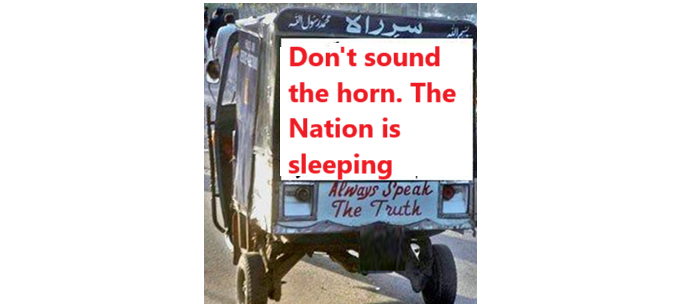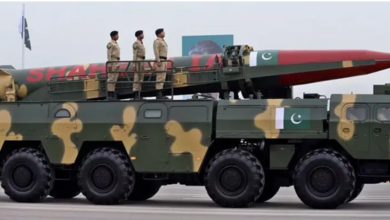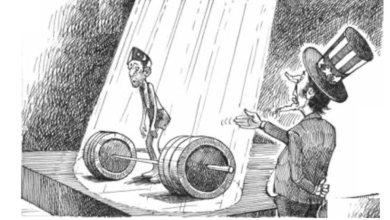Why is hunger, poverty, and deprivation your fate alone?
Leader or dealer: The tragedy of Pakistani politics
It seems as if all the problems in Pakistan have been solved. Poverty has vanished, and there is no longer any news of people committing suicide due to inflation. No child is deprived of education, and healthcare is now available to all without discrimination. Yet, the only remaining issues are the rebellion against the leader and the money laundering returned from Britain. Once these are resolved, rivers of milk and honey will flow through the country, and political parties are working tirelessly to solve these matters, eager to earn the public’s approval.
At one point, politicians seek support from Maulana Fazlur Rehman, whom they had insulted for years with derogatory terms. In response, Maulana adopted the same tone, but today, politicians from both sides once again join forces in the name of serving the country’s “fragile” state and the welfare of the people. The level of distrust and uncertainty is such that, as soon as the meeting ends, Maulana is seen embracing the government’s leaders, trying to elevate his political stature. The public now questions their memory, wondering whom to trust in the future.
Our political parties have full support from the media to further their agenda. The media, in turn, has found a perfect excuse to keep their channels running. Social media adds fuel to the fire, constantly escalating tensions. There’s always talk of secret negotiations, followed by calls for a social revolution. Recently, a rally was cancelled after a morning meeting at the prison gates, only for the opposition to later label the rivals as “tyrants” to encourage their supporters. Then, there’s the outcry over the extension of the Chief Justice’s tenure, and now the fight has shifted to the expansion of the number of judges, with both sides dragging each other into the court of public opinion.
The irony is that both the government and opposition are claiming victory over these issues. Meanwhile, parliament becomes a battleground, and the entire nation watches as politicians tear each other apart. But can the people expect their conditions to improve after this political drama?
A common complaint is that the lifestyle of politicians is vastly different from the people who elect them. However, a recent example from a small country, Uruguay, offers a stark contrast. Former President José Mujica set an example that our leaders could learn from, and if they did, their names would be mentioned with pride, free from scandals like the Panama Papers.
In Uruguay, things are different. Meet the former President of Uruguay, José Mujica. His lifestyle is entirely different from most other world leaders. He still lives in a small, rundown house and during his presidency, donated most of his salary to charity. His laundry spot is outside his house, and the water he uses comes from a nearby well surrounded by wildflowers. During his presidency, only two police officers and three dogs guarded his home, and today, even that security is gone because he no longer holds that entitlement, nor does he need it.
President Mujica declined the government’s luxurious official residence and chose to live in his wife’s home on the outskirts of the capital. His wife, during and after his presidency, works in the fields, growing flowers. Mujica’s lifestyle and his act of donating 90% of his salary, which was about 12,000 US dollars, to the poor, earned him the title of “the world’s poorest president.”
Sitting in his garden on an old chair, he said, “I have spent most of my life like this. Whatever I have, I can live comfortably with it.” After donating the majority of his salary to help the poor and small traders, his remaining income equalled that of an average Uruguayan citizen, around 775 dollars per month. According to Uruguayan law, when he declared his annual income in 2010, it amounted to 1,800 dollars, which was equivalent to the value of his 1987 car. Before taking office, he also declared his wife’s assets, which included land, tractors, and a house, valued at around 215,000 dollars—about one-tenth of the wealth declared by the Vice President.
Former President José Mujica was elected as the President of Uruguay in 2009. In the 1960s and 1970s, he was part of the left-wing armed group, the Tupamaro guerrillas. During that time, Mujica was shot six times and spent 14 years in prison, much of it under harsh conditions and in solitary confinement. After democracy was restored in 1985, he was released. According to Mujica, those years of imprisonment shaped the person he is today. He says, “I am often called the poorest president, but I don’t feel poor at all. Those who live lavish lifestyles, always striving for more, are the ones who are truly poor.”
He adds, “It’s a matter of freedom. If you don’t have a lot of possessions, you don’t have to work all your life to maintain them. This gives you more time for yourself.” Mujica, reflecting on his simple life, insists that this lifestyle was his free choice, even if people see him as an eccentric old man.
At the Rio+20 Summit, he echoed similar sentiments, stating: “We spent the entire afternoon talking about sustainable development, lifting people out of poverty. But what are we thinking? Do we want to imitate the consumption levels of wealthy nations? What will happen to the planet if every Indian owns as many cars as Germans? How much oxygen will we have left? Are there enough resources on this planet for seven or eight billion people to consume as much as those in rich societies?”
Mujica’s simplicity gained him admiration, but his government faced criticism. His popularity declined by 50% after his 2009 election, partly due to controversial policies. The Uruguayan Congress passed a law legalizing abortion up to 12 weeks into pregnancy, although Mujica did not vote for it. He also supported legislation granting the government a monopoly over the cannabis trade, arguing that drug trafficking, not consumption, was the real issue. Despite this drop in popularity, he wasn’t troubled, as he chose not to run for re-election in 2014 and retired from politics at 77. After retiring, Mujica lived comfortably on his pension, quietly helping some of his poorer friends. His modest lifestyle has continued.
The question arises: Why do our own politicians, who are well aware of the country’s economic situation, remain so entangled in their own interests? While details of their palaces abroad and offshore companies are widely known, the nation saw only Nawaz Sharif face trial among the 249 Pakistanis named in the Panama Papers scandal. Why was the demand for a simultaneous accountability process for both government and opposition so fiercely resisted by the opposition?
The judicial commission to investigate the Panama Papers was initially a united demand of the opposition. It was agreed that Nawaz Sharif and his family would be investigated first, followed by others. But when a joint meeting of opposition parties on May 2 failed to reach consensus on the Prime Minister’s resignation, the next day, a demand was issued for a three-month deadline for the Sharif family’s investigation, while allowing a year for others—a double standard that shocked the public.
Why is there such resistance to accountability? Why isn’t anyone asking how Asif Ali Zardari accumulated over $18 billion in assets? From denying ownership of the Surrey Palace to later claiming it in a British court, and from appointing a fugitive ambassador who erased corruption records, the misuse of national funds has gone unchecked. These same individuals are now in power, having passed laws to wipe away corruption cases.
Even those who protest the Panama Papers, like Imran Khan, have been found with offshore companies and properties. Instead of opposing the offshore holdings of his own party members, Khan is now facing a case related to land acquisition in the name of Abdul Qadir Trust following the UK’s £190 million recovery from property tycoon Malik Riaz.
In the end, what is left is a contrast between leaders like Mujica, who prioritized public welfare over personal gain, and our leaders, who remain embroiled in controversies. Why don’t our current leaders and opposition take a lesson from the former President of Uruguay? Do they want to be leaders or dealers?
اے مرے دیس کے لوگو! شکائت کیوں نہیں کرتے؟
تم اتنے ظلم سہہ کربھی بغاوت کیوں نہیں کرتے؟
یہ جاگیروں کے مالک اورلٹیرے کیوں چنے تم نے؟
تمہارے اوپر تم جیسے ہی، حکومت کیوں نہیں کرتے؟
یہ بھوک، افلاس تنگ دستی تمہارا ہی مقدر کیوں؟
مقدرکو بدلنے کی جسارت کیوں نہیں کرتے ؟
O people of my nation! Why do you not raise your voices?
Why, after enduring so much injustice, do you not rebel?
Why did you choose these feudal lords and looters?
Why do you not govern yourselves?
Why is it your destiny to face hunger, poverty, and misery?
Why don’t you have the courage to change your fate?






